List of current longest-ruling non-royal national leaders
This list of current longest-ruling non-royal national leaders is a list of the current living longest-ruling heads of nation-states or national governments, excluding royalty, who have served ten years or longer, sorted by length of tenure. Heads of generally recognized sovereign states are ranked by number, while heads of sovereign states with limited international recognition are listed in italics and are not given a numbered rank.
The individuals on the list are not always the most powerful figure in their country's national government. Some are or have been at one time the most powerful figures in their country's national government but not necessarily continuously throughout the listed timespan. Some of them have held more than one national leadership-level office: presidency, prime minister-ship, or some other title implying or widely believed to confer national leadership. When more than one such office exists in a country, there may be uncertainty as to which member of the national government actually has the ultimate power. Therefore, this list combines all national level offices held concurrently or consecutively by each individual leader.
| Rank | Image | Name | Age | Country | Office | Tenure began | Length of tenure |
|---|---|---|---|---|---|---|---|
| 1. |  |
Paul Biya | 87 | Prime Minister, then President[1] | 30 June 1975 | 45 years, 222 days | |
| 2. | 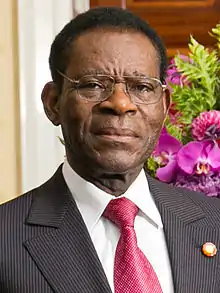 |
Teodoro Obiang Nguema Mbasogo | 78 | President[2] | 3 August 1979 | 41 years, 188 days | |
| 3. |  |
Ali Khamenei | 81 | President, then Supreme Leader[3] |
13 October 1981 | 39 years, 117 days | |
| 4. | 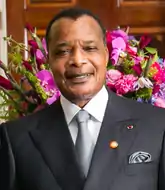 |
Denis Sassou Nguesso | 77 | President[4] | 8 February 1979 – 31 August 1992 (1st time) 25 October 1997 – present (2nd time) |
36 years, 310 days | |
| 5. | .jpg.webp) |
Hun Sen | 68 | Prime Minister[5] | 26 December 1984 | 36 years, 43 days | |
| 6. |  |
Yoweri Museveni | 76 | President | 26 January 1986 | 35 years, 12 days | |
| 7. |  |
Idriss Déby | 68 | President[6] | 2 December 1990 | 30 years, 67 days | |
| 8. | .jpg.webp) |
Nursultan Nazarbayev | 80 | Chairman of the Security Council, formerly President[7] |
16 December 1991 | 29 years, 53 days | |
| 9. | 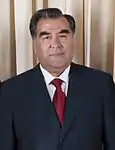 |
Emomali Rahmon | 68 | De facto Head of State, then President[8] |
19 November 1992 | 28 years, 80 days | |
| 10. | .JPG.webp) |
Isaias Afwerki | 75 | President[9] | 24 May 1993 | 27 years, 259 days | |
| 11. |  |
Paul Kagame | 63 | Acting Head of State, then President[10] |
19 July 1994 | 26 years, 203 days | |
| 12. |  |
Alexander Lukashenko | 66 | President | 20 July 1994 | 26 years, 202 days | |
| 13. | .jpg.webp) |
Daniel Ortega | 75 | Acting Head of State, then President[11] |
4 March 1981 – 25 April 1990 (1st time) 10 January 2007 – present (2nd time) |
23 years, 80 days | |
| 14. | .jpg.webp) |
Tuilaepa Aiono Sailele Malielegaoi | 75 | Prime Minister | 23 November 1998 | 22 years, 76 days | |
| 15. |  |
Ismaïl Omar Guelleh | 73 | President | 8 May 1999 | 21 years, 275 days | |
| 16. |  |
Vladimir Putin | 68 | Prime Minister, then President[12] | 9 August 1999 – 7 May 2000 (1st term as Prime Minister) 8 May 2000 – 7 May 2008 (1st & 2nd terms as president) 8 May 2008 – 7 May 2012 (2nd term as Prime Minister) 7 May 2012 – present (3rd & 4th terms as president) |
21 years, 182 days | |
| 17. | 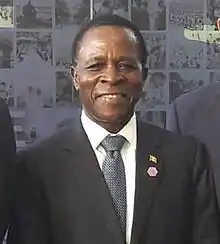 |
Keith Mitchell | 74 | Prime Minister | 22 June 1995 – 9 July 2008 (1st time) 20 February 2013 – present (2nd time) |
21 years, 4 days | |
| 18. |  |
Hage Geingob | 79 | Prime Minister, then President[13] | 21 March 1990 – 28 August 2002 (1st time) 4 December 2012 – present (2nd time) |
20 years, 225 days | |
| 19. | .jpg.webp) |
Bashar al-Assad | 55 | President | 17 July 2000 | 20 years, 205 days | |
| 20. |  |
Ralph Gonsalves | 74 | the Grenadines |
Prime Minister | 29 March 2001 | 19 years, 315 days |
| 21. | .jpg.webp) |
Recep Tayyip Erdoğan | 66 | Prime Minister, then President[14] | 14 March 2003 | 17 years, 330 days | |
| 22. |  |
Ilham Aliyev | 59 | Prime Minister, then President[15] | 4 August 2003 | 17 years, 187 days | |
| 23. |  |
Shavkat Mirziyoyev | 63 | Prime Minister, then President[16] | 12 December 2003 | 17 years, 57 days | |
| 24. | _(cropped).jpg.webp) |
Sheikh Hasina | 73 | Prime Minister | 23 June 1996 – 15 July 2001 (1st time) 6 January 2009 – present (2nd time) |
17 years, 54 days | |
| 25. |  |
Roosevelt Skerrit | 48 | Prime Minister | 8 January 2004 | 17 years, 30 days | |
| – |  |
Mahmoud Abbas | 85 | Prime Minister, then President[17] | 19 March 2003 – 6 September 2003 (1st time) 15 January 2005 – present (2nd time) |
16 years, 194 days | |
| 26. |  |
Lee Hsien Loong | 68 | Prime Minister | 12 August 2004 | 16 years, 179 days | |
| 27. |  |
Faure Gnassingbé | 54 | President[18] | 5 February 2005 – 25 February 2005 (1st time) 4 May 2005 – present (2nd time) |
15 years, 299 days | |
| 28. | 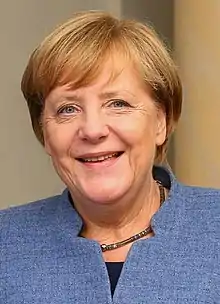 |
Angela Merkel | 66 | Federal Chancellor | 22 November 2005 | 15 years, 77 days | |
| 29. |  |
Benjamin Netanyahu | 71 | Prime Minister | 18 June 1996 – 6 July 1999 (1st time) 31 March 2009 – present (2nd time) |
14 years, 330 days | |
| 30. |  |
Viktor Orbán | 57 | Prime Minister | 6 July 1998 – 27 May 2002 (1st time) 29 May 2010 – present (2nd time) |
14 years, 214 days | |
| 31. | .jpg.webp) |
Raúl Castro | 89 | First Secretary, formerly also President and Prime Minister[19] |
31 July 2006 | 14 years, 191 days | |
| 32. |  |
Frank Bainimarama | 66 | Acting Head of State, then Prime Minister[20] |
29 May 2000 – 13 July 2000 (1st time) 5 December 2006 – present (2nd time) |
14 years, 109 days | |
| 33. |  |
Gurbanguly Berdimuhamedow | 63 | President[21] | 21 December 2006 | 14 years, 48 days | |
| 34. | 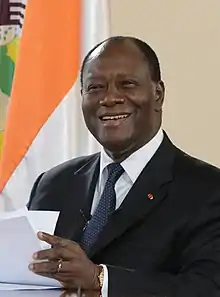 |
Alassane Ouattara | 79 | Prime Minister, then President[22] | 7 November 1990 – 9 December 1993 (1st time) 4 December 2010 – present (2nd time) |
13 years, 97 days | |
| 35. | .JPG.webp) |
Mahinda Rajapaksa | 75 | Prime Minister[23] | 6 April 2004 – 19 November 2005 (1st term as Prime Minister) 19 November 2005 – 9 January 2015 (Term as president) 26 October 2018 – 15 December 2018 (2nd disputed term as Prime Minister)[24] 21 November 2019 – present (3rd term as Prime Minister) |
12 years, 41 days | |
| 36. |  |
Ueli Maurer | 70 | Federal Council Member, formerly President[25] |
1 January 2009 | 12 years, 37 days | |
| 37. | _(cropped).jpg.webp) |
Macky Sall | 59 | Prime Minister, then President[26] | 21 April 2004 – 19 June 2007 (1st time) 2 April 2012 – present (2nd time) |
12 years, 5 days | |
| 38. |  |
Miloš Zeman | 76 | Prime Minister, then President[27] | 22 July 1998 – 15 July 2002 (1st time) 8 March 2013 – present (2nd time) |
11 years, 329 days | |
| 39. | 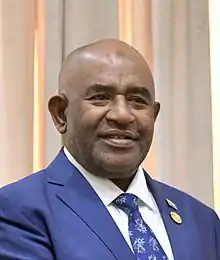 |
Azali Assoumani | 62 | President[28] | 30 April 1999 – 21 January 2002 (1st time) 6 May 2002 – 26 May 2006 (2nd time) 26 May 2016 – present (3rd time) |
11 years, 178 days | |
| 40. | _(cropped).jpg.webp) |
Borut Pahor | 57 | Prime Minister, then President[29] | 21 November 2008 – 10 February 2012 (1st time) 22 December 2012 – present (2nd time) |
11 years, 128 days | |
| 41. |  |
Ali Bongo Ondimba | 61 | President | 16 October 2009 | 11 years, 114 days | |
| 42. |  |
Mahamadou Issoufou | 70 | Prime Minister, then President[30] | 17 April 1993 – 28 September 1994 (1st time) 7 April 2011 – present (2nd time) |
11 years, 105 days | |
| – |  |
Arayik Harutyunyan | 47 | Prime Minister, then President[31] | 14 September 2007 – 25 September 2017 (1st time) 21 May 2020 – present (2nd time) |
10 years, 273 days | |
| 43. | .jpg.webp) |
Mark Rutte | 53 | Prime Minister | 14 October 2010 | 10 years, 116 days | |
| 44. |  |
Simonetta Sommaruga | 60 | Federal Council Member, formerly President[32] |
1 November 2010 | 10 years, 98 days | |
| 45. | .jpg.webp) |
Bounnhang Vorachith | 83 | President, formerly Prime Minister and General Secretary[33] |
27 March 2001 – 8 June 2006 (1st time) 22 January 2016 – present (2nd time) |
10 years, 89 days | |
| 46. |  |
Alpha Condé | 82 | President | 21 December 2010 | 10 years, 48 days | |
| 47. | .jpg.webp) |
Nguyễn Phú Trọng | 76 | General Secretary and President[34] |
19 January 2011 | 10 years, 19 days |
See also
Footnotes
- Was Prime Minister of Cameroon from 30 June 1975 to 6 November 1982
- Was Chairman of the Revolutionary Military Council / Supreme Military Council of Equatorial Guinea from 3 August 1979 to 12 October 1982
- Was President of Iran from 13 October 1981 to 2 August 1989, leaving the presidency close to two months after becoming Supreme Leader. Was approved as Supreme Leader of Iran by the Assembly of Experts and sworn in on 4 June 1989, shortly after the death of the founder of this Shia Islamic republic, Ruhollah Khomeini.
- Was previously President from 8 February 1979 to 31 August 1992, when the country was a one-Party state known as the People's Republic of the Congo
- Was Acting Prime Minister of the Vietnam-occupation one-Party state called the People's Republic of Kampuchea from 26 December 1984 to 14 January 1985, then Prime Minister of the Vietnam-occupation one-Party state People's Republic of Kampuchea from 14 January 1985 to 1 May 1989. Was also Prime Minister during the entire existence of the State of Cambodia from 1 May 1989 to 24 September 1993.
- Was President of the Council of State of Chad from 2 December 1990 to 4 March 1991
- Was First Secretary of the Communist Party of the Kazakh SSR from 22 June 1989 to 14 December 1991, Chairman of the Supreme Soviet (Speaker of Parliament and de facto head of state) of the Kazakh SSR from 22 February 1990 to 24 April 1990, and President of the Kazakh SSR from 24 April 1990 to 16 December 1991, on which date Kazakhstan declared independence from the Soviet Union. He has an emeritus position as permanent Chairman of the Kazakh National Security Council from 12 July 2018 to the present.
- Was Chairman of the Supreme Assembly (Speaker of Parliament) of Tajikistan – de facto head of state – from 19 November 1992 to 16 November 1994
- Was Secretary-General of the Provisional Government of Eritrea from 27 April 1991 to 24 May 1993, when Eritrea declared independence from Ethiopia.
- Was the Vice President of Rwanda and Commander in Chief of the Rwandan Patriotic Army while he was the Acting Head of State from 19 July 1994 to 22 April 2000.
- Was a member of the Nicaraguan Junta of National Reconstruction from 18 July 1979 to 4 March 1981, then the Coordinator of the Junta of National Reconstruction (effectively the head of state) from 4 March 1981 to 10 January 1985; he was then President from 10 January 1985 to 25 April 1990.
- Was Prime Minister of Russia from 9 August 1999 to 7 May 2000 and Acting President from 31 December 1999 to 7 May 2000; then President of Russia from 7 May 2000 to 7 May 2008; then Prime Minister again from 8 May 2008 to 7 May 2012.
- Was Prime Minister of Namibia from 21 March 1990 to 28 August 2002 and 4 December 2012 to 21 March 2015
- Was Prime Minister of Turkey from 14 March 2003 to 28 August 2014
- Was Acting President of Azerbaijan from 6 August 2003 to 31 October 2003
- Was Prime Minister of Uzbekistan from 12 December 2003 to 14 December 2016, and Acting President from 8 September 2016 to 14 December 2016.
- Was Prime Minister of the Palestinian National Authority from 19 March 2003 to 6 September 2003
- Was President of Togo from 5 February 2005 to 25 February 2005, when it was disputed whether he had inherited the presidency from his deceased father, Gnassingbé Eyadéma.
- Was Acting President and Acting Prime Minister of Cuba from 31 July 2006 to 24 February 2008, then President and Prime Minister of Cuba from 24 February 2008 to 19 April 2018; and Acting First Secretary of the Communist Party of Cuba from 31 July 2006 to 19 April 2011. Under the one-Party system, the position of First Secretary is a more important and powerful office than the Presidency of Cuba.
- Was President of the second Interim Military Government of Fiji from 29 May 2000 to 13 July 2000; then President of a third Interim Military Government of Fiji from 5 December 2006 to 4 January 2007. Was Acting Prime Minister from 5 January 2007 to 22 September 2014.
- Was Acting President of Turkmenistan from 21 December 2006 to 14 February 2007
- Was Prime Minister of Côte d'Ivoire from 7 November 1990 to 9 December 1993. The Presidency was disputed between Ouattara and Laurent Gbagbo from 4 December 2010 to 11 April 2011.
- Was Prime Minister of Sri Lanka from 6 April 2004 to 19 November 2005, President of Sri Lanka from 19 November 2005 to 9 January 2015, then the disputed Prime Minister of Sri Lanka (with Ranil Wickremesinghe) from 26 October 2018 to 15 December 2018.
- The office of Prime Minister was disputed between Mahinda Rajapaksa and Ranil Wickremesinghe from 26 October 2018 to 15 December 2018.
- The Swiss Federal Council is a collective seven-member head of state. Maurer previously served as chairperson of the Federal Council, i.e. the President of the Swiss Confederation, in the constitutional customary one-year period from 1 January to 31 December 2013 and 1 January to 31 December 2019. From 1 January to 31 December 2012 and 1 January to 31 December 2018, he was the deputy chairperson of the Federal Council, or Vice President of Switzerland.
- Was Prime Minister of Senegal from 21 April 2004 to 19 June 2007
- Was Prime Minister of the Czech Republic from 22 July 1998 to 15 July 2002
- Was Chief of Staff of the National Development Army (de facto leader of the Comoros) from 30 April 1999 to 6 May 1999, Head of State of the Comoros from 6 May 1999 to 21 January 2002, then the elected President from 6 May 2002 to 26 May 2006.
- Was Prime Minister of Slovenia from 21 November 2008 to 10 February 2012
- Was Prime Minister of Niger from 17 April 1993 to 28 September 1994
- Was Prime Minister of the Republic of Nagorno-Karabakh from 14 September 2007 to 25 September 2017. The country was called the Republic of Nagorno-Karabakh until 10 March 2017.
- The Swiss Federal Council is a collective seven-member head of state. Sommaruga previously served as chairperson of the Federal Council, i.e. the President of the Swiss Confederation, in the constitutional customary one-year period from 1 January to 31 December 2015 and 1 January to 31 December 2020. From 1 January to 31 December 2014 and 1 January to 31 December 2019, she was the deputy chairperson of the Federal Council, or Vice President of Switzerland.
- Bounnhang was Prime Minister of Laos from 27 March 2001 to 8 June 2006, and was General Secretary of the Lao People's Revolutionary Party from 22 January 2016 to 15 January 2021; he has been President since 20 April 2016. Under the one-Party system, the position of General Secretary is a more important and powerful office than the Presidency of Laos.
- Trọng has been the President of Vietnam since 23 October 2018. Under the one-Party system, the position of General Secretary of the Communist Party of Vietnam is a more important and powerful office than the Presidency of Vietnam.
External links
- Rulers.org List of rulers throughout time and places